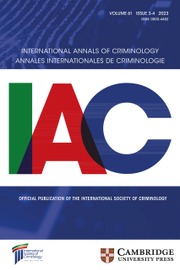No CrossRef data available.
Article contents
Religiosity and Political Islam: Divergent Influences on Support for Terrorism
Published online by Cambridge University Press: 01 September 2023
Abstract
This study examines the intricate relationship between religion and attitudes towards terrorist violence, with a specific focus on individual sympathy for al-Qaeda and justification for suicide bombings. While religion has the capacity to promote both harmony and social cohesion, as well as division and conflict, it is crucial to explore the complex and contradictory nature of religious beliefs in relation to individuals’ attitudes towards terrorism. To address this paradox, the study differentiates between religion as a belief and religion as an ideology. Drawing from a subset of the 2011 Pew Global Attitudes Survey, encompassing countries with substantial Muslim populations (Egypt, Indonesia, Jordan, Lebanon, and Turkey), the research investigates how religiosity and political Islam influence public attitudes towards terrorism, considering political and economic grievances in these contexts. Multivariate statistical analysis suggests that religiosity and political Islam exhibit distinct associations with the justification of suicide bombings and support for al-Qaeda, and these dynamics vary across countries. Ultimately, the study underscores the importance of perceiving religiosity not as a threat but as a potential remedy to prevent extremism by fostering an educated and deeper understanding of religious principles.
Abstracto
Este estudio examina la intrincada relación entre la religión y las actitudes hacia la violencia terrorista, con un enfoque específico en la simpatía individual por al-Qaeda y la justificación de los atentados suicidas. Si bien la religión tiene la capacidad de promover tanto la armonía como la cohesión social, así como la división y el conflicto, es crucial explorar la naturaleza compleja y contradictoria de las creencias religiosas en relación con las actitudes de las personas hacia el terrorismo. Para abordar esta paradoja, el estudio diferencia entre la religión como creencia y la religión como ideología. A partir de un subconjunto de la Encuesta de Actitudes Globales Pew 2011, que abarca países con poblaciones musulmanas sustanciales (Egipto, Indonesia, Jordania, Líbano y Turquía), la investigación investiga cómo la religiosidad y el islam político influyen en las actitudes públicas hacia el terrorismo, considerando las quejas políticas y económicas. en estos contextos. El análisis estadístico multivariante sugiere que la religiosidad y el islam político exhiben distintas asociaciones con la justificación de los atentados suicidas y el apoyo a al-Qaeda, y estas dinámicas varían entre países. En última instancia, el estudio subraya la importancia de percibir la religiosidad no como una amenaza, sino como un remedio potencial para prevenir el extremismo al fomentar una comprensión educada y más profunda de los principios religiosos.
Abstrait
Cette étude examine la relation complexe entre la religion et les attitudes envers la violence terroriste, avec un accent particulier sur la sympathie individuelle pour al-Qaïda et la justification des attentats-suicides. Alors que la religion a la capacité de promouvoir à la fois l’harmonie et la cohésion sociale, ainsi que la division et le conflit, il est crucial d’explorer la nature complexe et contradictoire des croyances religieuses par rapport aux attitudes des individus envers le terrorisme. Pour aborder ce paradoxe, l'étude différencie entre la religion comme croyance et la religion comme idéologie. S’appuyant sur un sous-ensemble de l’enquête Pew Global Attitudes Survey de 2011, englobant des pays à forte population musulmane (Égypte, Indonésie, Jordanie, Liban et Turquie), la recherche examine comment la religiosité et l’Islam politique influencent les attitudes du public à l'égard du terrorisme, en tenant compte des griefs politiques et économiques. dans ces contextes. L’analyse statistique multivariée suggère que la religiosité et l’Islam politique présentent des associations distinctes avec la justification des attentats-suicides et le soutien à al-Qaïda, et ces dynamiques varient selon les pays. En fin de compte, l'étude souligne l’importance de percevoir la religiosité non pas comme une menace mais comme un remède potentiel pour prévenir l’extrémisme en favorisant une compréhension éduquée et plus profonde des principes religieux.
抽象的
这项研究探讨了宗教与对恐怖主义暴力的态度之间错综复杂的关系,特别关注个人对基地组织的同情和自杀式爆炸的合理性。 虽然宗教有能力促进和谐和社会凝聚力,也有能力促进分裂和冲突,但探索宗教信仰与个人对恐怖主义态度之间的复杂性和矛盾性至关重要。为了解决这一悖论,该研究区分了 作为一种信仰的宗教和作为一种意识形态的宗教之间。 该研究取材于 2011 年 Pew 全球态度调查的一部分,涵盖穆斯林人口众多的国家(埃及、印度尼西亚、约旦、黎巴嫩和土耳其),调查宗教信仰和政治伊斯兰教如何影响公众对恐怖主义的态度,同时考虑到政治和经济不满 在这些背景下。 多元统计分析表明,宗教信仰和政治伊斯兰教与自杀性爆炸的合理性和对基地组织的支持表现出明显的关联,而且这些动态因国家而异。 最终,该研究强调了不应将宗教信仰视为一种威胁,而应将其视为通过促进对宗教原则有根据的、更深入的理解来防止极端主义的潜在补救措施的重要性。
خلاصة
تبحث هذه الدراسة في العلاقة المعقدة بين الدين والمواقف تجاه العنف الإرهابي ، مع التركيز بشكل خاص على التعاطف الفردي مع القاعدة وتبرير التفجيرات الانتحارية. في حين أن الدين لديه القدرة على تعزيز كل من الانسجام والتماسك الاجتماعي ، وكذلك الانقسام والصراع ، فمن الأهمية بمكان استكشاف الطبيعة المعقدة والمتناقضة للمعتقدات الدينية فيما يتعلق بمواقف الأفراد تجاه الإرهاب. لمعالجة هذا التناقض ، تميز الدراسة بين الدين كعقيدة والدين كعقيدة. استنادًا إلى مجموعة فرعية من استطلاع المواقف العالمية لعام 2011 Pew ، والتي تشمل البلدان التي تضم عددًا كبيرًا من السكان المسلمين (مصر وإندونيسيا والأردن ولبنان وتركيا) ، يبحث البحث في كيفية تأثير التدين والإسلام السياسي على المواقف العامة تجاه الإرهاب ، مع الأخذ في الاعتبار المظالم السياسية والاقتصادية في هذه السياقات. يشير التحليل الإحصائي متعدد المتغيرات إلى أن التدين والإسلام السياسي يظهران ارتباطات متميزة مع تبرير التفجيرات الانتحارية ودعم القاعدة ، وهذه الديناميكيات تختلف عبر البلدان. في نهاية المطاف ، تؤكد الدراسة على أهمية النظر إلى التدين ليس كتهديد ولكن كعلاج محتمل لمنع التطرف من خلال تعزيز فهم متعلم وأعمق للمبادئ
Keywords
- Type
- Article
- Information
- Copyright
- © International Society of Criminology, 2023




